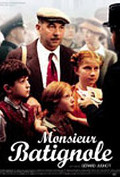
Directed by
Gerard Jugnot
100 minutes
Rated M
Reviewed by
Bernard Hemingway

Monsieur Batignole
Synopsis: Paris, summer 1942. France is under German occupation. Edmonf Batignole (Gerard Jugnot) a butcher whose future son-in-law (Jean-Paul Rouve) is an active collaborator, inadvertently and to his shame takes part in the deportation of a Jewish family. When the youngest son Simon (Jukes Sitruk) unexpectedly returns, Edmond decides to hide him beginning an adventure that has surprising consequences.The opening scene of this film tells you exactly what you’re going to get. In a spotless, deserted early morning Parisian street a young boy who’s just been robbing Monsieur Batignole’s charcuterie emerges from a small coal chute door, hops on the back of his accomplice’s bicycle and the pair dart off trailing a string of sausages. It’s a familiar, if not downright clichéd, image of insouciant mischievousness. That in the context of the narrative it unconsciously leads to tragedy is very much the pivot on which the film turns. Although far less markedly than Begnini’s Life Is Beautiful, Monsieur Batignole takes an uncharacteristically light-hearted approach to the subject of the 20th century’s most infamous case of ethnic cleansing. Director Gérard Jugnot is less concerned with depicting Nazi brutality, of which we have innumerable filmic representations, than with revealing the banality of the Parisian people’s complicity with a phenomenon of which they had no direct experience and which they chose not to have. The tone is affably mocking, equally of both the French collaborators (Jean-Paul Rouve is a hoot as the hack playwright and ultra-nationalist flunky ) and their Nazi masters, and any heroism is completely unintended.
Although Jugnot, who also plays the diffident main character, has chosen this resonant historical moment as the setting for his film and it does form an important element of it, the main theme is really to be found in the relationship between Monsieur Batignole and his unsought-for young charge. Like Kolya (Jan Sverak, 1996), this is really about a middle-aged male in adverse circumstances finding his own child within .
Jugnot ‘s approach to his subject may be seen as too easy, an escapist fiction of moral salvation, but on the other hand it is neither glib nor didactic and if, like the string of sausages, he opts for the reassuringly familiar, the result is well-crafted and consistently enjoyable. It is also a fastidious production and a visual treat for lovers of 40s style. In this latter respect, the film seemed a little anachronistic, reminiscent of "le style retro" of French films of the '70s. Not that there’s anything wrong with that. Monsieur Batignole is solid, all-round entertainment for a "mature" audience.

Want more about this film?


Want something different?




